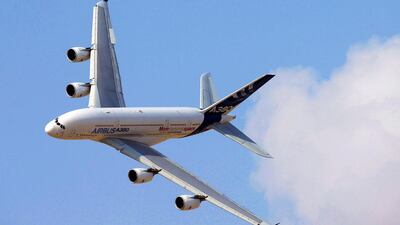MIAMI // The chief executive of Airbus said his company was not as yet "working actively" to make the A380 more fuel efficient, after Emirates, the aircraft's biggest customer, challenged Airbus to do so.
“So far we are not working actively on it because I don’t think it’s today’s priority, but we got the message of Emirates and one day we will come up with a re-engine version,” said Fabrice Bregier, president and chief executive of Airbus, on the sidelines of the International Air Travel Association’s (Iata) annual general meeting in Miami.
Emirates, which operates the world’s biggest fleet of A380s, has been insisting that Airbus improve the fuel efficiency of the double-decker aircraft.
The airline had said that it could order 100 more aircraft if a less thirsty engine became available.
The demand for a more fuel-efficient engine for the A380 comes as the future of the aircraft remains unknown.
Airbus had flagged the possibility of stopping the production of the A380 because of poor sales, but Mr Bregier seemed to be optimistic. "I think we will find new customers, hopefully this year. We have such a support from Emirates that keeps the programme afloat," he said, declining to identify the new customers who will buy the aircraft.
Separately, Mr Bregier said he did not think that a decision would be taken to review open skies agreements, given their economic value to many countries.
“I cannot imagine that decision will be taken against the growth of traffic, because it brings a lot of value to the economies of the countries. I am a strong believer of open skies and open competition,” he said. “There is a debate between the airlines. I don’t want to be part of it because they are all my customers.”
Arabian Gulf airlines – such as Emirates, Etihad Airways and Qatar Airways – are locked in a row with some American and European airlines over the issue of free competition.
The US carriers, along with Lufthansa and Air France-KLM, are urging their governments to reassess the bilateral aviation agreements with the UAE and Qatar, because they allege that the GCC states provide subsidies to their national airlines, which distorts competition in the international markets that they operate in.
Airlines in the Arabian Gulf have rebutted the claims, and said that any limitations on them would stifle consumers’ choice and hurt the aviation industry as a whole.
selgazzar@thenational.ae
Follow The National's Business section on Twitter

